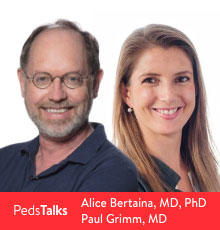Request an Appointment
Dual Immune/Solid Organ Transplant (DISOT) for Kidney Failure
“Empowering parents to donate stem cells and a kidney to their child, eliminating the worry of organ rejection.” |
If you have a child with a failing kidney, you may feel like there are no ideal care options available to you. Maybe your child has had a kidney transplant but her or his immune system has rejected it. Or your child faces a long wait on the donor transplant list. Possibly the requirement of a lifetime of immunosuppressive medicines and the need for future kidney transplants is too daunting.
We have a new solution. Our pediatric transplant doctors have revolutionized care for children who need a kidney transplant by developing a groundbreaking procedure called dual immune/solid organ transplant (DISOT), which was featured in the New England Journal of Medicine in June 2022. We are the only hospital in the world that is currently offering this revolutionary approach.
About dual immune/solid organ transplant
With dual immune/solid organ transplant (DISOT), a stem cell transplant is followed by a kidney transplant about five to 10 months later. The stem cells create a new immune system in your child, and the kidney from the same donor is accepted and flourishes. The idea of this two-transplant approach has been around for decades, yet it has been difficult for researchers to implement. We’ve succeeded in developing a new approach.
Parents serve as donors
You may have been told that you are not a donor match with your child, but our transplant doctors have perfected a method that changes this. It empowers you to be your child’s partially matched donor by selectively eliminating alpha/beta T-cells (the immune system’s fighter cells) from your donated stem cells. This groundbreaking method of stem cell transplantation was developed here at Stanford Medicine Children's Health by Alice Bertaina, MD, PhD—the worldwide pioneer and foremost expert in alpha/beta T-cell depleted haploidentical (partially matched) stem cell transplantation. This method:
- Empowers parents or other genetically half-matched relatives to be the donor.
- Removes the type of immune cells that play a role in organ rejection and graft-versus-host-disease, an otherwise frequent complication (these immune cells recover 60–90 days after transplant, so your child regains full immune function).
- Makes stem cell transplants safer for even medically fragile children who are too sick for a traditional stem cell transplant.
Benefits of DISOT, our two-transplant approach
- Because both the stem cells and the kidney are from the same donor (often a parent), your child acquires a new immune system that recognizes the kidney and doesn’t reject it.
- Since your child’s body recognizes the kidney, it doesn’t constantly fight it. This eliminates the need for long-term immunosuppressive medicines, which are hard on kidneys and have undesirable side effects.
- It empowers your child to feel better. He or she is likely to experience more energy and renewed growth and development.
- It gives your child a chance at a much longer-lasting kidney. The constant battle between a child’s immune system and a transplanted kidney can lead to loss of the transplant after only 10–12 years. With DISOT, there’s a good chance that your child might not need a future kidney transplant.
- It eliminates the wait (which can be years) for a donated kidney because it comes from a parent.
Who can receive a dual immune/solid organ transplant (DISOT)
As a research trial, we’ve performed DISOT successfully on children who have had a select group of blood diseases and immune diseases, including SIOD and FSGS. In all cases, the children have achieved normal kidney function, and their quality of life has been much improved. DISOT appears to be a potential cure for these immune diseases. We offer DISOT for the following conditions:
- Schimke immuno-osseous dysplasia (SIOD). An extremely rare genetic disease that affects multiple systems in the body, including the kidneys.
- Autoimmune focal segmental glomerulosclerosis (FGGS). A rare disease where the immune system produces a chemical that causes tiny filters in the kidneys to leak. The filters become scarred, which can ultimately lead to progressive kidney failure. We offer DISOT to children with FSGS whose bodies have already rejected a prior kidney transplant.
- Systemic lupus erythematosus. A blood disease that causes the immune system to attack its own cells and tissues. Replacing the immune system first helps to eliminate the chance of organ transplant rejection. We offer DISOT to children with lupus whose kidneys are damaged.
- Cystinosis. A rare genetic blood disease where an amino acid builds up and damages organs and tissues, including the kidneys. We offer DISOT to children with cystinosis whose kidneys are damaged.
Why choose Stanford Medicine Children’s Health for DISOT
- DISOT gives you a new, effective solution for your child’s kidney failure and need for kidney transplant—and real hope if you’ve experienced little before.
- We are DISOT pioneers and leaders, and the only hospital in the world to offer this approach.
- Your child is cared for by a multispecialty team of internationally and nationally respected pediatric stem cell and kidney transplant specialists, nephrologists, and neuroimmunologists.
- Stanford Medicine Children’s Health has performed over 1,000 stem cell transplants since the program’s inception. We are a national leader in pediatric kidney transplant volumes.
- Our program on alpha/beta T-cell depletion is the biggest in the country.
- We participate in groundbreaking research in immune diseases, including SIOD, led by David B. Lewis, MD, in our SIOD research lab.
Listen to our kidney and transplant doctors talk about DISOT
Want your child to be evaluated for DISOT?
Have your child’s nephrologist contact us at (650) 498-4905.

Connect with us:
Download our App: